What can you say about a famous 1970 novel, that nowadays gets remembered more for its nostalgic fashion than literary merit? That it was brief. That it was stocked with characters from central casting. That it made everyone cry. Including me, many times.
This is about the blockbuster novella LOVE STORY. It’s not a spoiler to tell you that Jennifer dies; it’s on page 1. The other 130 pages are Oliver’s memories. There are minor plot spoilers below, but I doubt any of them would quash your enjoyment of this book should you choose to read it after I tear it apart below.
Love stories have sure changed in the past half-century.
Love Story was initially a screenplay, but Erich Segal adapted it as a novel, and it became the publishing sensation of 1970. The movie was released the next year, and Ali McGraw and Ryan O’Neal became the Kate and Leo of their era.
Rereading this novel, I found myself looking at it from the point of view of a reader of contemporary romance. Below, I share my take on how Love Story fits (or doesn’t) in with the tropes and conventions modern readers expect in a love story.
Where I mention books below, I don’t mean to shoehorn them into “Romance” only. Many have other predominant genres and more elevated literary merit.
ROMANCE TROPES
Tropes are shorthand terms to describe the starting premise of a story. Readers have tropes they prefer (say, Enemies to Lovers or Hidden Identity). Does Love Story have a trope? Yes, several!

Some tropes are classics. Class Difference (Rich/poor, Different World): Pride and Prejudice, North And South. Forced Proximity: Wuthering Heights. Hidden Identity: Shakespeare’s comedies. Friends to Lovers: Far from the Madding Crowd. Amnesia: The Moonstone.
Twenty-first century tropes include: Opposites Attract, Single Parent, Best Friend’s Brother / Brother’s Best Friend, Meet Cute, Sweet/Steamy/Spicy to signal the intensity of on-page sex, Sex First, Second Chance, Fake Relationship, Holiday Romance, Hidden Identity, Grumpy X Sunshine, Enemies to Lovers. I know, right, so many!
Class Difference
Class Difference is Love Story’s key trope. Oliver Barrett IV, a Harvard hockey jock of such elite pedigree there is a building named after his ancestors on campus, meets Jennifer Cavilleri, a scholarship music student whose immigrant forbears sweated in the textile mills where the Barretts made their millions a long time ago. Oliver, the epitome of masculine WASP of the era, and Jenny (more organic) start with sweary banter and soon he has her hooked on watching him earn penalty minutes on the ice. It’s told in Oliver’s first person, the hockey jock transformed by love.
J&O fall in love, (closed door or “Sweet” level of steam) and when Jenny tells him she's going to Paris to study with Nadia Boulanger after graduation, Oliver counters with a marriage proposal. Jenny gives up her dream, and his parents estrange him for marrying too young.
“What irks you most, Father – that she’s Catholic or that she’s poor?”
“What attracts you most?”
Oliver Barret III says he’ll cut Oliver off without a penny if he marries Jenny now instead of waiting until he finishes law school. Reader, he married her.
Class Difference x Campus Romance
Campus life can be a social equalizer. Oliver may be rich, but Jenny is just as smart, maybe smarter; she earned a scholarship to Radcliffe (now part of Harvard). Similarly, in Normal People. Marianne and Connell grow up on opposite sides of their small town, but, like Jennifer, Connell elevates himself to a prestige university where other characteristics matter more (not that there aren’t intrusions of class; he has to work while Marianne’s upper-crust friends binge drink, dress up, and act silly). In My Oxford Year, a middle-class American student gets involved with an upper-crust Brit. Pursuit of higher education allows them to find a meeting ground of comparable intelligence and ambition. (Prince William and Kate Middleton, huh? though the culture can only see one of them as ambitious).
Class Difference x Rich/Poor
In Pride and Prejudice, Darcy's aunt, Lady Catherine de Bourgh forbids Lizzie to marry him, advising her to stay in “the sphere in which you have been brought up.” Lizzie responds, “In marrying your nephew, I should not consider myself as quitting that sphere. He is a gentleman; I am a gentleman’s daughter; so far, we are equal.“ It’s the financial disparity (and her unruly family) that’s the problem.
In Crazy Rich Asians, Rachel assumes she’s on a level with her boyfriend. Both are successful professionals. He goes to a scummy gym. His wealth is not noticeable (a Hidden Identity). Then he takes her to Singapore and she’s dropped into the world of the super-rich.
In many rich/poor scenarios, it’s often the poor person trying to adapt to the world of the rich person. It’s not too often that the rich guy has to slum it. In Nora Goes Off Script, Leo is a movie star who is charmed by single mother Nora’s small-town life, meatloaf on Tuesdays and the middle-school play. But when he wants a change, he Ubers gourmet pizza from Manhattan. And we know in the end everyone will be rich. In Love Story, Jenny works while Oliver goes to law school. Rich/Poor pivots to Poor/Poor. Salty wisecracking continues, and despite scraping and scrounging, they are happy. Oliver doesn’t complain to the reader about all the ways you can stretch pasta.
Love Story plays briefly with the Opposites Attract trope. Music major x Jock. A writer of today would milk that for mini-conflicts and opportunities to grow. But Segal does nothing with it, other than having them choose Oliver’s future earning power and head-of-household right to a career, over Jenny’s musical world with its minimal earning potential.
So, Love Story tucks comfortably into the Class Differences, Rich/Poor and Opposites Attract tropes. But wait, there’s more!
Reformed Rake
If we don’t grasp the momentousness of their relationship, it is proven when he refuses to recap their sex life for the entertainment of his jock friends. Usually, they spill the details of their “amorous triumphs.” This book doesn’t tell you if the women talk about sex, because Jenny is de facto the only woman in it, except for cameos of Oliver’s mother and the friend who stands in their small wedding. It’s Oliver’s point of view, after all. Thinking about it this way makes me wonder, though, if the current romances I’m reading would pass the Bechdel Test. Stay tuned for another essay on this!
“Whatja get tonight, Ollie? Ray asked.
“An assist and a goal,” I replied.
“Off Cavilleri.”
“None of your business,” I replied.
There is a He Falls First trope, but Oliver’s roommates, the future Big Swinging Dicks of Wall Street, might say Pussy-Whipped. Nowadays, “Refuses to Share Salacious Details” couldn’t be a thing because the heroes are super-sensitive and nice. At least, in the romances I read. On the other hand, there’s a theme that I don’t have the exact name for, let’s say, Reformed Rake, found in probably hundreds of pseudo-Regency romances. You know, he’s carelessly bedded wenches and baronesses from Cornwall to Fife, but THIS GIRL is different. Oliver, I’m squinting at you.
Hockey
What would Segal think of the newest bonkbuster genre – Hockey player romance? It’s taking TikTok by storm. I have never read one, but I assume they excel at describing how hunky the men are, and how many amps of electric current. Sometimes the women are also athletes; in one case she’s his children’s nanny (Canadian Boyfriend, 2024). I’m not a hockey fan. I’m sure the fellas are hella nice, and only beat people up on the ice, but I can’t even.
CONVENTIONS OF ROMANCE WRITING
In addition to a clear trope or three, there are conventions. Many of the conventions I chat about below came from the excellent podcast of Savannah Gilbo, Fiction Writing Made Easy.
Beauty and chemistry
Love Story has a sad lack of significant looks, pining, declarations, or descriptions of physical characteristics. In Annabel Monaghan’s delightful Summer Romance (2024), Ethan’s forearms are mentioned more than all references to O&J’s bodies here. Jenny has brown eyes. We assume dark hair since she’s Italian-American. And he tells us in the first line of Chapter One that she is beautiful. We’re expected to believe it and move on! Oliver sneaks his hockey program statistics into the pages, which reveals he’s 5’11 and 185 lbs.
And let’s review a ubiquitous shortcut for sizzle, the physical spark when you touch the object of your affections, even before you know you like them. Lucy and Felix in Carley Fortune’s This Summer Will Be Different (2024) experience more mild shocks than Jenny and Oliver eat lunch. Ugh.
The genius is that Segal convinces us of their love without any of this. In fact, he convinces us of their rightness for each other despite Oliver being a boorish, entitled jock. This paragraph is as close as Oliver’s first-person account gets to tender. I mean, okay.
“Our honeymoon was spent on a yacht and with twenty-one children. That is, I sailed a thirty-foot Rhodes from seven in the morning till whenever my passengers had enough, and Jenny was a children’s counselor. It was a place called the Pequod Boat Club in Dennis Port (not far from Hyannis), an establishment that included a large hotel, a marina and several dozen houses for rent. In one of the tinier bungalows, I have nailed an imaginary plaque: “Oliver and Jenny slept here—when they weren’t making love.” I think it’s a tribute to us both that after a very long day of being kind to our customers, for we were largely dependent on their tips for our income, Jenny and I were nonetheless kind to each other. I simply say “kind,” because I lack the vocabulary to describe what loving and being loved by Jennifer Cavilleri is like. Sorry, I mean Jennifer Barrett.”
My rating: Fail on depiction of looks and chemistry. Oliver tells, but doesn’t show. On the other hand, the quote above is sublime. Worthy of the conversations in Curtis Sittenfeld’s Romantic Comedy (2023) which has perfect in-love dialogue.
Inner Wound
The main character(s) must have an inner wound, which creates all kinds of problems. For example, in Funny Story (2024) by chart-topping author Emily Henry, both Miles and Daphne have parental wounds (a widespread origin of metaphorical internal bleeding). Daphne and her mother were abandoned by her feckless father who drops into her life occasionally but never makes her a priority. This leads her to freak out over minor unexplained absences and decide to pack it in. Miles is estranged from his narcissistic mother and enabler father, and lacks confidence in himself as a partner. Untrustful behavior which makes it hard to stay happy together. But they work it out eventually.
In Love Story, the wounds (Jenny's mother dying when she was young, Oliver's resentment of how his name and numeral define him,) don't stop them from committing to and loving each other in a pretty un-bumpy straight line that has never, ever appeared on a plot graph in any fiction workshop anywhere. Jennifer’s “wound” of past family tragedy isn’t a bug, it’s a feature. It makes her love unconditionally, but Oliver’s, combined with his macho nature, makes him resentful and cold to his family, which bothers her. But she forgives.
My rating: Pass. Only Oliver’s wound doesn’t get fixed during the novel, which isn’t satisfactory and wouldn’t pass today. On the last page, there may be a Barrett rapprochement, too late. But I’ll let it pass.
Intimacy Rituals
Shared traditions, private languages, and inside jokes that they only do with one another. Teasing put-downs, check. “Carry me over the threshold, Preppie,” check.
My rating: Pass.
Stakes and Time Pressure
All forms of writing make use of stakes, or what the character stands to lose or gain. In Summer Romance, there are high emotional stakes as Ali tries to compartmentalize her budding relationship as ending with the summer, and counters his idea that they can make it work long term. There is also a ticking time clock – he’ll be going back to his town far away. Good books have at least one tension-building deadline, and may have both personal and professional stakes. Have to finish writing the book but have writer’s block. Need to get this relationship off the ground before the multi-day hike is over. Need to figure out who the hell I am before my imminent wedding.
Segal bothers very little with these. Finishing law school is going to happen on time for brilliant Oliver in the book, and that’s enabled even more in the movie, with Jenny showing up at the law school with a bag of groceries and making him a sandwich while he doesn’t even stop reading a textbook. Ugh. There aren’t even many ups and downs, till the big down at the end.
My rating: Fail.
Helpers and Harmers
Characters in favour (or not in favor) of the relationship. I don’t see anyone really aiding and abetting though it was nice of his roommate to let Oliver hang a tie on the doorknob so often. Oliver’s parents, of course, are harmers. But one of the reasons Segal could make this work in 131 pages is the unwavering focus on the two leads, and omission of any non-mission-critical characters. I’ve read a lot of authors who actually might learn from this, in moderation.
My Rating: Bare pass courtesy of stone-faced Oliver Barrett III.
A Specific External Goal
Something outside of the relationship, specific and timely, that your character thinks will bring him happiness or fulfillment, aside from love. It’s often couched as a want, when the purpose of the plot is to get them what they need, which may not be what they want. In Summer Romance, Ali wants her life to work as it has before, despite all the external things that have changed. At the end, she surprises herself by asking if she can run the inn, which is actually her perfect job.
J&O both have dreams for after graduation. For him, law school. For her, further study in Paris. As I said above, Jenny’s external goal gets ditched in a scant two pages, after which they both pursue Oliver’s. This would never fly now. I mean, women don’t go to university to get their “M.R.S. degree” any more, do they? In the movie, Oliver redeems himself a tiny bit by saying that, when they move to New York for his first job, he’s encouraged her to attend Julliard, but she wants to have a baby. So, there’s that.
My rating: Pass, because they share the goal. I don’t want to re-victimize Jennifer: she made the choice to be part of pursuing his goal, even if we judge from the new millennium.
Masculine and Feminine Sensibilities
Distinct differences in the ways they view and approach love and their roles, creating a push/pull dynamic. I am not sure this is a universal convention, but it’s here. Oliver likes being the head of household and wishes he didn’t have to live off Jenny’s earnings. Jenny likes being a wife. The real macho stuff comes out when Oliver is counseled by the (male, obviously) doctor to avoid telling Jenny she has terminal cancer for as long as possible, in her own best interest (?). Ridiculous today, but probably believable in 1970, because there is no cure. Oliver chooses normalcy for as long as they can have it. In my opinion, Oliver did the best he could in accordance with the doctor’s advice. Of course, today it’s different.
People, it was the mid sixties:
J&O married in 1964. The Beatles performed for the first time in the USA. Sidney Poitier was the first African-American actor to win an Oscar for Best Actor in a Leading Role, but race was a deadly issue all over the world. At the Vatican II meetings, a few women were invited but never permitted to speak. Ford sold half a million Mustangs. The Equal Pay Act was passed in 1963, but when Jenny starts teaching music at a private school, she’s told by the simpering headmistress that a Barrett won’t need a large salary.
In 1970, when the book was published, the Beatles were breaking up. The Godfather hit cinemas and people hit the streets of New York City for the first Gay Rights, Earth Day marches and Women's Strike for Equality. At Kent State, four students were killed during an anti-war demonstration. In London, the Miss World beauty pageant was picketed by Women's Liberation protesters.
In the five years spanned by the book, inches of progress were made by legislation intended to open the adult world up to women, but sex discrimination was still rampant. It wasn’t until 1981 that state laws making a husband “head and master” with unilateral control of property owned jointly with his wife were overturned.
Before Love Story hit the shelves, the public’s schmaltz receptors were primed by Bobby Goldsboro’s maudlin 1968 hit Honey (the largest-selling record in the world that year). It’s a patronizing song about a young wife who died: “She was always young at heart, Kinda dumb and kinda smart, And I loved her so, And I surprised her with a puppy, Kept me up all Christmas eve…” Ugh.
We have to read in context of the period.
My rating: Pass. Men were men and women were women. (or maybe “girls”)
A Love Triangle
Someone (or something) who’s competing for the affections of a lead character. Love Story has this potential, but again Segal ignores the opportunity to develop tension. Oliver overhears her saying “I love you, Phil,” on the phone; on the next page, we learn that’s what she calls her father. Could you not make him WAIT A LITTLE! She tells him she’s going to study in Paris after graduation. He’s anxious for less than five minutes. A page and a half later, they’re engaged. Today’s stories would milk this kind conflict for five chapters, and only close one when they open the next.
My rating: Fail.
Internal Conflict and Change
For the protagonist to face, and overcome. Examples: a limiting belief, a bad habit, major self-doubt. The character is supposed to go through a period of reflection and change, ideally from interactions with the other character.
This is how transgressive Love Story is – yes, Oliver has the internal conflict that he fails to deal with. Jenny tries to make him reconcile with his family but he turns away. (The surprise here is that Ollie can give and receive love sincerely and unconditionally without cleaning up his internal conflict/wound. What!? Writing coaches the world over heave a collective sigh.) Jenny dies not having been able to help the Barretts reconcile. At the very end of the book, we’re teased with the indication he may reconcile with Daddy Dearest; in the movie, not really. In a romance novel of today, the protagonist would have to reconcile with the family to make him lovable. Ugh.
MY RATING: A tie. Oliver has internal conflict but does not change. Segal broke the rule and got away with it.
A Happily Ever After Ending
A HEA or HFN is needed in contemporary romance (Happy Ever After, or Happy for Now). This is the payoff to the reader for enduring the ups and downs, fun and games, progress and setbacks of the attempted relationship over the 200 pages of Act 2 of a 320-page book. Love Story has a sad ending.
Okay, we all knew my comparison was going to fail here. Love Story is not a romantic comedy. It’s a romantic tragedy. There are far fewer romance books with tragic endings. Me Before You, The Light We Lost, A Walk to Remember.
In the 70s, I was so mad at Erich Segal for killing Jenny. With age comes better acceptance of the circle of life. I see the brilliance that in such a short book he can operate on our emotions with characters who say things like (when he tells her excitedly that he came third in his class at Harvard Law):
“Christ, Jenny,” I kind of whined. “Say something!”
“Not until I meet numbers one and two,” she said.
MY RATING: Fail.
Foreshadowing
Somewhere in the first part of the book, alert readers are supposed to see a clue to what’s really going to happen and the overarching theme. For example, if Jenny’s mother died of the same disease as she’s going to have. It’s not there, but we get it in the Elizabeth Barrett Browning poem Jenny recites at their wedding. The poem alludes to a true marriage of souls; despite the heavenly connection, they must continue to live in the “contrarious” world. The last lines refer to the inevitably of death . “What bitter wrong can the earth do to us,” indeed.
In the movie, there is more – a line not in the book – when Oliver asks why Jenny doesn’t believe in God, she says she never thought anything could be better than what we have here, now. To me, that’s a very nicely packaged theme and makes sense of her life.
My rating: Pass.
TOTAL SCORE : PASS
PASS: 6, FAIL: 4. But judge for yourself! Read the book and see the movie. I'm sad that Jenny didn't live long enough to have kids with Oliver and go back to music later, and I'm especially sorry that Oliver didn't make up with his parents when she was alive. But I don’t have to say I'm sorry to have spent time in this little story about unconditional love.
HOT COMPS
I had fun choosing entries for the Venn diagram below. Favorites are:
Mothering Sunday (2016) – a literary novella so devastating, you’ll lose your mind. Movie, same. Bonus - good things happen, eventually.
The Fault in Our Stars (2012) – this was the Love Story of my daughter’s junior high era. Nicknamed “TFIOS: Tiffy-o’s.” I cried; darling daughter didn’t. Book and movie both well done.
North and South (1855). For me, a TV-miniseries-first story. A passionate masterpiece! I “read” the book (via audiobook, Juliet Stevenson narrating), also a masterpiece.
THE COVER
The novel was released with the title in block lettering, and later, movie-tie-in covers. The block lettering style was likely pirated from (or homage to?) Robert Indiana’s famous sculpture in NYC, L-O-V-E, which was new and fresh in 1970. In my opinion this cover wouldn’t fly today, especially with those colours which bring to mind avocado, gold and orange decorating colour schemes of the 70’s.
Below, I respectfully submit my designs to update the cover art to appeal to contemporary readers.
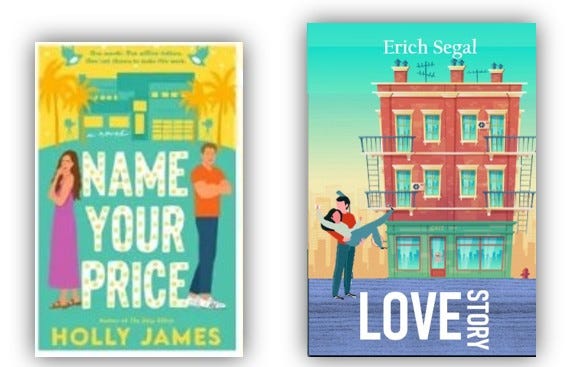
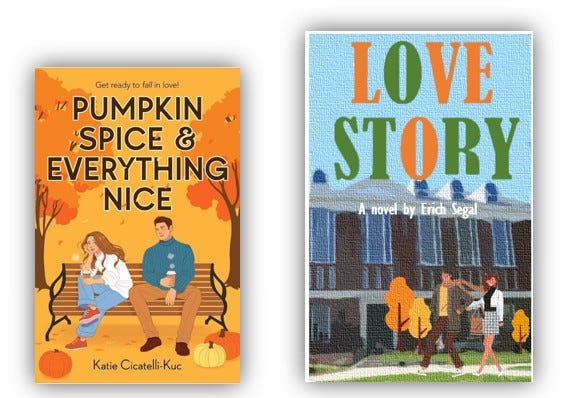
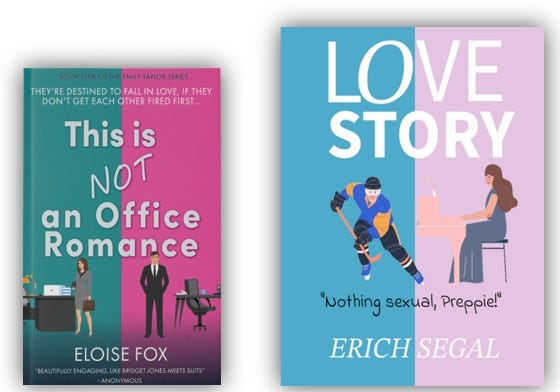
LEGACY
THE TITLE
Google Love Story, and you get lots of hits on the generic topic of ‘love story.’ Erich Segal couldn’t have predicted the inconvenience of not offering a unique #hashtag for all the social media love. Writers still name their books with names that are really the genre label: Beach Read, Summer Romance.
THE LINE
“Love means never having to say you’re sorry.” Jenny says it to Oliver when he apologizes after their big fight. We get her intention. But in real life, saying sorry is needed all the time in relationships, and not just in Canada. Jenny meant that she loved Oliver so much she forgave his immaturity, temper and the millionaire-father-shaped chip on his shoulder. Oliver then quotes it to his father, who has been kept in the dark about Jenny’s illness, and arrives at the hospital just after she dies. It has never worked, but never been forgotten either. Kind of like, “What we’ve got here is a failure to communicate” from Cool Hand Like (1967).
THE FASHION
In the book, on their first meeting, Oliver dislikes her bohemian clothing. She gets a glow-up in the movie, with the gorgeous wardrobe on lovely Ali MacGraw. The camel coats! The plaid skirts and coloured tights! Top fashion magazines and style blogs reminisce and reboot this “preppie” look every few years. January’s RED UK has a cute feature on iconic cold-weather wardrobes from much-loved movies, Love Story picture below. Honestly, I think you can get close facsimiles at H&M or Aritzia.
In contrast, I don’t think Ryan O’Neal’s costumes in the movie have worn as well. He always seems to be wearing too many layers that don’t fit under his blazers.
THE JENNIFER WAVE
Use of the name Jennifer peaked, and held, for years after Love Story. Fun fact: My mother, 89, was named after Shirley Temple, and you can’t open the obituaries without finding a Shirley on any given day. The Jennifer boom beat Shirley by a wide margin. Watch for daily Jennifer obituaries starting in the 2040s.
WHO WAS ERICH SEGAL?
A classics professor at Yale, a screenwriter (credits include Yellow Submarine) and novelist. Read this paragraph from his obituary in the Globe and Mail by, Don Rubin:
Segal's interest at that time - and for most of his life - was the relationship between high and low culture. His specialty was the Roman playwright Plautus who was a master of taking the most refined high culture ideas and retreading them for the average plebe-in-the-street. That was what really fascinated Segal. Eternal verities transmuted into populist gold.
I have already kept you too long to start on the sequel, Oliver’s Story (1978), a quite different book, but watch this stack. Erich’s daughter Francesca Segal is also a novelist; her 2024 novel Welcome to Glorious Tuga has been described as elegant, uplifting, heartwarming and funny.
CONCLUSION
I still have the copy I cried over as a teen, one of the few books that I kept from that era (along with The Hobbit, Little Women, and Narnia). It should have been returned to the Gloucester High School Library in Ottawa, Ontario in 1974, but we moved to Nova Scotia in October of that year so we’ll accept that my older sister intended to return it but forgot before our parents loaded five kids into a wood-paneled station wagon and drove the 1200 kilometres (which at the time was 750 miles) to our new home.
I thoroughly enjoyed rereading and analyzing Love Story, and sharing it with you.
BONUS CONTENT
If you are old enough to remember Love Story from the first time around, you may still have cable. TCM is playing the movie on Friday, February 7 as part of their February Oscars month (the movie had many nominations but only won for the beautiful score by Francis Lai).
GIVEAWAY: I’m holding a draw on February 14 (the 55th anniversary of Love Story the novel) for a copy of the book, for all my Substack subscribers!

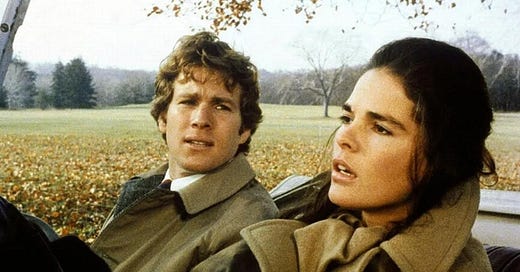



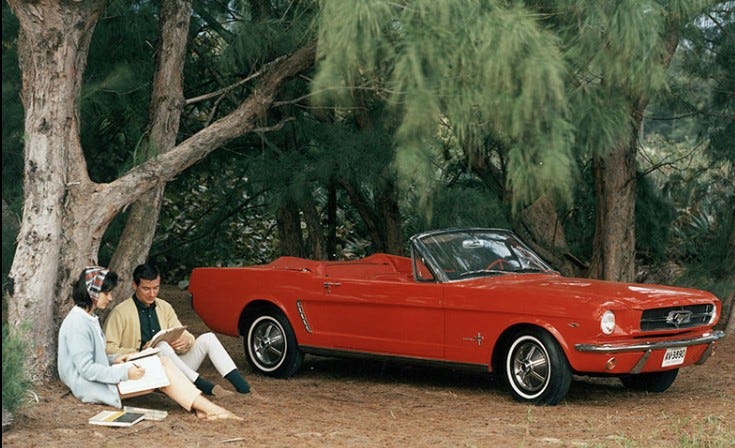
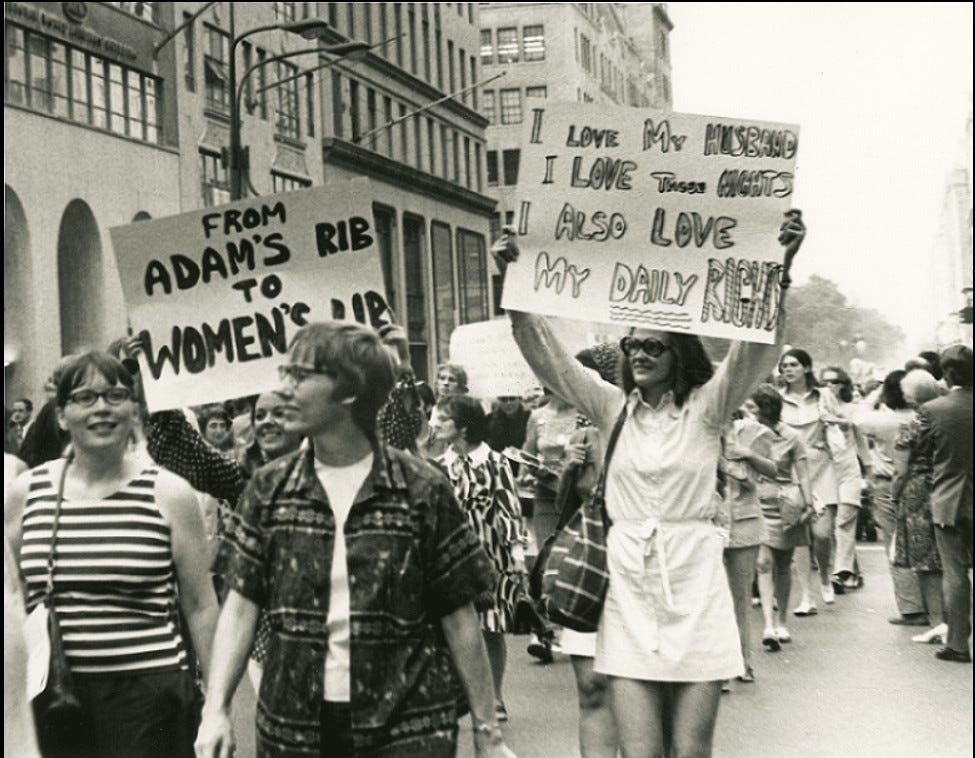
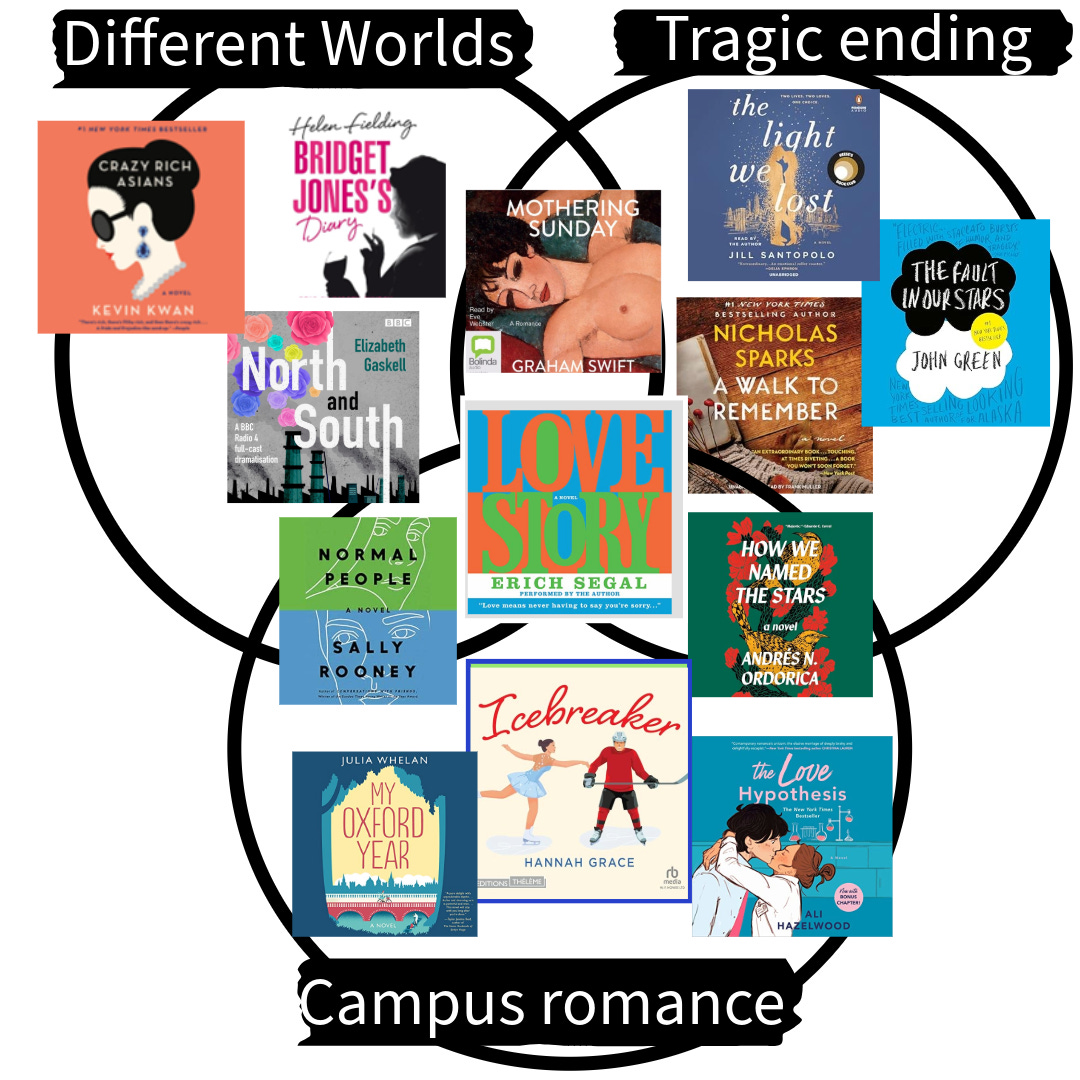
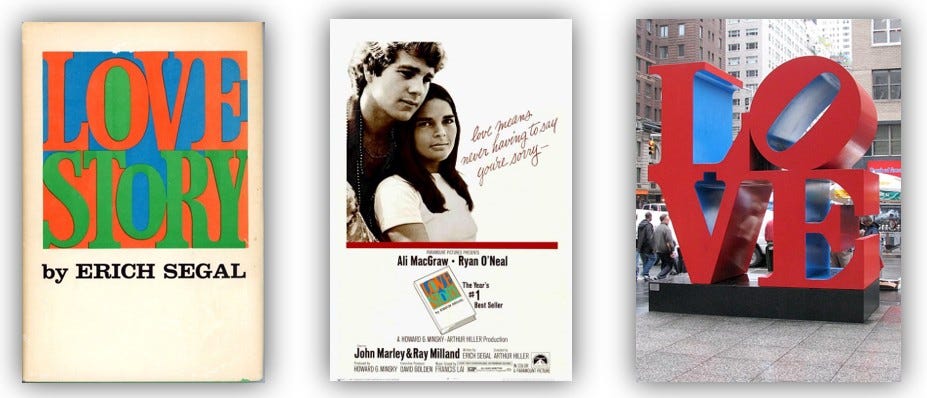
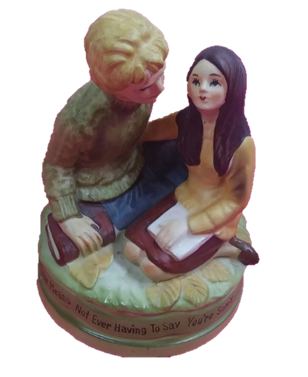
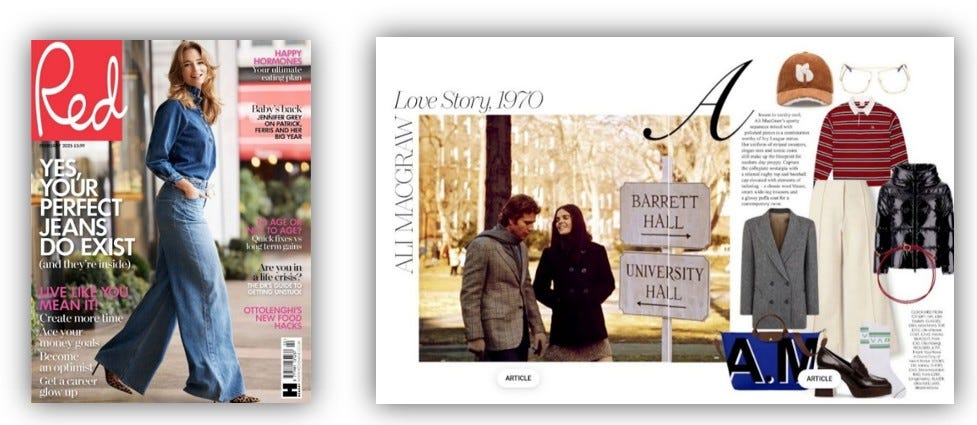

What a brilliantly thought-out perspective of it all! Thank you for such a comprehensive post!
Sarah
DELIGHTFUL! I have a long and storied relationship with this novel, which I wrote about the last time I reread it! https://picklemethis.com/2014/02/13/rereading-love-story-for-valentines/